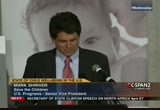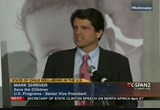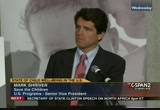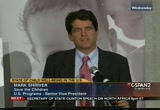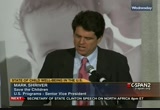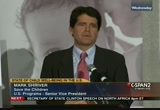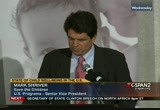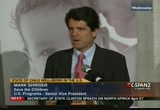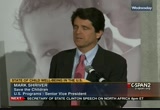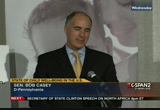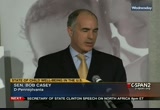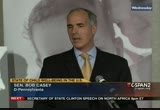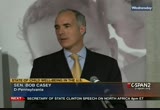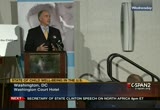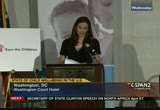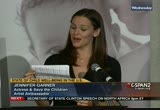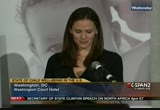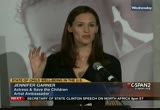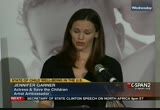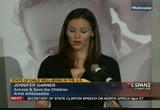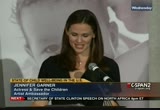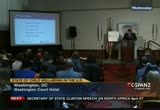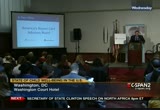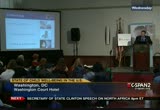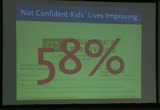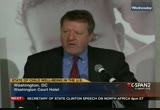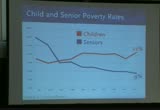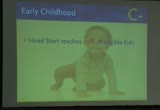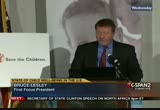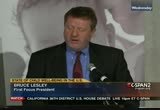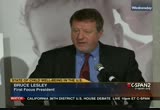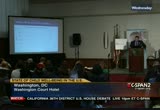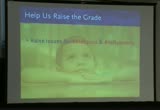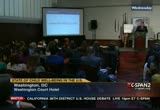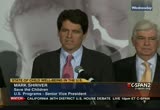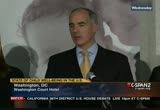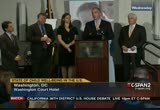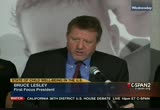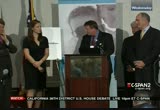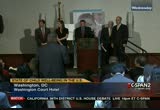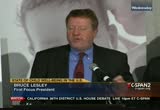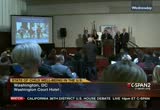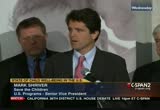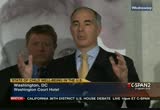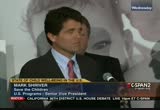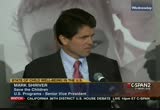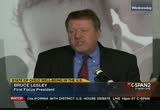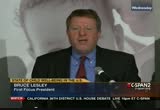tv Close Up CSPAN October 12, 2012 7:00pm-8:00pm EDT
7:00 pm
be associated with you. jennifer has been in ambassador for u.s. programs for four years. we met she was she was pregnant that she give birth to her second child and she has been a reluctance fierce advocate on behalf of america's kids for the last four years and has done an amazing job. we were together last week in seattle, washington. we would not have looked at programs about an hour outside of seattle. she has been to our programs all across the country. california, seattle, washington state to west virginia where we started a programs as a result of her advocacy with no senator mentioned, then governor mentioned has been fantastic. i get to introduce senator casey, so hold that same things nice things about you for a couple minutes. that's okay, right? just a couple quick words the senator mentioned about save the
7:01 pm
children. we are well known for her work internationally and a hundred 30 countries around the world. here in the united states where we started almost 80 years ago as a program focused in kentucky, helping kids affected by depression or networks in over 200 schools within school, afterschool literacy programs at about 130, 140 communities under status to school success program from which they home visiting program for young kids and their parents, ages zero to five. the results are fantastic and it's enabled us to grow over the last six or seven years since the great recession happened because they are clear, demonstrative, showing when kids start the program are certain levels and end a year later have made strides in lebanon, doubling the number of kids in almost 70% of the kids are showing statistically relevant changes in reading skills, which is a fantastic number given the
7:02 pm
number of kids entering the program not prepared to learn. bruce mentioned the status of kids in this country today. 60 million kids, almost 22% living in poverty. for those kids under the age of five, the poverty race or worse. most 25% of the kids under the age of five are living in poverty and for many of those kids, they're living in extreme poverty. as many of you know, but i think it's worth repeating to the price, those first five years of life are crucial. most 90% of brain growth happens in those first five years of life. senator dodd just mentioned, are almost flat until the kid enters kindergarten. when you show the church of businessmen and women are in the country, d.c. appeared brain growth, public investment, it's a huge lost opportunity. so what we want to talk about if i were not making that
7:03 pm
investment. and if we look historically, we can see in the mid-1960s, the poverty rate for kids and seniors were the same as they are for kids today. about 25% living in poverty in 1865. when my father started the war on poverty under president johnson at the appointed time, within 10 years, those rates at both drop down 15%. and the senior rate has continued to drop today. today it is at its lowest rate ever, 9%, risk is poverty rates for children have continued, unfortunately, to go back up to where it is today it almost 23, 24%. the senator dodd eloquently said, the reason is pretty clear. kids don't vote, don't have political action can teams. they're not on television. i think that is absolutely an issue we have to address. i just want to talk quickly about one of the issues in the
7:04 pm
report, early childhood education. as senator dodd said come we've made great progress. the home visitation program for new and expecting moms that live in high-risk communities. the race to the top an income of $500 billion in 2011 and an additional $133 million for the top five runner-up states in 2012. but the facts remain, even though that is good news, less than 5% of the kids eligible for early head start by getting early head start services in this country today. depending on your number, but in our report we showed that less than 30% of the kids eligible for head start by getting services today. there's no question the quality needs to go up in both of those. save the children is now running head start programs in arkansas and soon in louisiana to improve
7:05 pm
the quality of services delivered by those programs. we need to do a better job in making sure child care dollars are spent more efficiently and effectively having an impact on cancer at the bottom under means we should not talk about whether to get those programs, but making additional investment to make more eligible kids get those services and to increase the quality of the services going out there. and it's not just me saying that our first focused and save the children. there are countless other entities. the center for american progress says that by 2020, china, one of our biggest competitors is total 40 million children in preschool, a 50% increase from today and provides 70% of children with three years of preschool. the united states has no national plan and no offers or plans to invest additional dollars in early childhood education. that is outrageous. ben bernanke has called for an increase investment in early childhood education can be seen the payoff can be especially
7:06 pm
high. for instance, preschool programs have been shown to increase high school graduation rates because high school graduates have higher earnings, pay more taxes and are less likely to use public health programs investing in such programs can pay off, even from the narrow perspective of state budget. of course he returned to the overall economy and the individuals themselves are much greater. the nobel prize winner out of the university of chicago, which is no flaming liberal organization has said that the most important investment we can make an early childhood education. as bruce said come on record in congress, not the administration. we are not great in any particular institution with this report, but we are calling upon all americans to make and to demand more investment from our leaders, both on the state, federal and local level. senator dodd said we do as a country believe children are our
7:07 pm
most important resource. but the bottom line is we don't do it. we don't invest in our case. despite the fact many political leaders say kids are the most important resource, we don't miss the country put our money where our mouth is and that's national tragedy and a national shame that we're hoping that this report will highlight some areas we should be investing our dollars that should not just be bobbing our heads at all the adults come to say kids are most important resources in and do nothing about it. we have been playing that game for too long. one of the guys who does not play that game on capitol hill is senator casey. senator dodd talked about his great work on the health committee. the uncle often talked about the great work that senator casey was engaged in. he's been one of the stalwart advocates for the children's health insurance program. it's been a strong, strong support of the 21st century fund program that supports
7:08 pm
efforts like say the children's work in rural america all across the country. he has joined jennifer, senator mikulski and others to introduce early childhood legislation that unfortunately has not passed because we have not garnered the bipartisan support in the early childhood education a priority that this country needs. senator casey has introduced legislation and were hopeful when he gets reelected this fall it will go back up to capitol hill and continue to push forward. senator bob casey. [applause] >> thank you very much. mark, thank you and save the children for this report and for your great work over so many years. we're grateful to work with organizations like save the children and first focused. thank you for your great work and for getting a report that. you know, senator dodd and i were talking about having this report and a couple years ago, once while in washington and
7:09 pm
asked for report, you actually get it. so we're grateful for that. and chris dodd, i'm so happy to see you again. so grateful for your work and your leadership and the voice he brings to these issues. it is more than a voice of passion and commitment. that is vitally important. you have to have a heart and a commitment, but he's got a long record of achievement, substantial achievement. as you recall some of the work going on the road, make sure you make children a priority. i think senator dodd reminds us again that meeting the challenges outlined in this report can't be one party. it has to be bipartisan and it has to be public and private. not one entity, not one part of our society. by reciting some history, it reminds us in challenges us to do all we can to bring the
7:10 pm
parties together. we are so grateful. jennifer, thank you for your great leadership. i'll be introducing jennifer in a couple minutes. out to make a couple points about the report. this report provides a report card, but in large measure provides a measure of accountability. it is a mirror into which you don't look often enough to reflect upon where we are, the commitment we make to our kids. i've always said that what brings on this room together, no matter who you are, what brings you in this room is the basic fully that every child is born with a light inside them. for some children that light is so magnificent they don't need a lot of help because of circumstances or because of their natural ability. prefer some kids they need extra help. that may be early education, health or family can provide, whatever it is.
7:11 pm
we've got to make sure i think it's the obligation of every public official, every elected official at every level to do you can to make sure that the full measure of that light inside every ship is reached. no matter what the full measure of the potential is. we've got a ways to go before we can say we are doing that. we've made some great progress under the leadership of senator dodd and others. we have a long way to go on the public site. the private sector has got to help us do well in both parties obligation. there was a great line somewhere in the scriptures about a faithful friend. you've heard this line before. a faithful friend is a sturdy shelter. he was found one has found a treasure. when you see the results of a report like this, whether a c, see or even be, and so we get today, we ask whether or not we are the faithful friend to the
7:12 pm
children that we should be, but i think we have to be to compete in an internationally difficult and challenging economy. but also i think to ask ourselves, isn't that what we should be doing as a nation? report like this allows us to measure where we are and also provide a roadmap so that we can afford in the future. so i think one of the things we can do in washington for both parties is to commit ourselves to be in a really committed and authentic faithful friend to her children. one of the ways we do this is not simply by focusing on the public policy, does, legislation, public policy work, but also partnering with people well beyond washington the premier voice, their passion and commitment to an issue like this. jennifer garner has done that is
7:13 pm
so anyways. we know her as an actress and artist first and foremost. as for most of us became aware of her work. but i know her as an advocate. she's a mom, too and we got a letter today that indicates the commitment of her whole family to these issues that she might read for us. but i'm so grateful for her work as an advocate. someone who brings an articulate voice, it was a passion, but also for several commitment to making sure the brazenness report cargo up and will be the faithful friend to her children that they should be. i'm honored to introduce someone who's done about work over many years found on these issues, jennifer garner. [applause] >> thank you so much. thank you for your kind words,
7:14 pm
senator casey for having me here today. i did bring a better along. you know, kids do not love, my kids and i'm sure yours when i leave town, but my kids really know that when i leave town for save the children, i do it with joy and a sense of purpose and i try to help them understand and help include them in that sense of purpose. and last night -- now cover that before when i sign my six-year-old, i'm going to be gone. we backed the next day. this is what i'm doing. i'm going to speak with some senators and then i happened to be speaking at the cia later today. and she disappeared for a bit and came back with a letter she wrote absolutely on her own. and it says, dear senators and cia.
7:15 pm
[laughter] please give my mom the money she wants for save the children. it is a really good pot. i appreciate the time he's taken him a letter. sincerely violet affleck. so there's one person. we've got this taken care of. so, i'm thrilled to be here in the midst of people are committed to strengthening our country's commitment to our kids and i particularly honored to have senator dodd with this. senator dodd, as i said before, i don't think we could've asked for a stronger advocate for nation's children. i walked into a party your dirty setup for me. i have no doubt that when historians debate the legacy of your service, they will all agree and your dedication to children in the particularly live in poverty. its unparalleled and i cannot thank you enough for your
7:16 pm
leadership. [applause] i also want to thank you for passing the torch for her great friend from the commonwealth, senator casey. since arriving at 2006, senator casey has become one of the fiercest child advocates in congress. he's been a star supporter early childhood education, which is my favorite issue and has been a privilege working with you the past two years. so thank you. [applause] by senator casey mentioned, i'm an ambassador for u.s. programs. i met mark shirer for years about from our first conversation, and you save the children was a place for me. you see, i grew up in west virginia and has seen first-hand the effect of poverty, resigned hopelessness that permeates many forgotten communities that mark and his team serve. just last week on the market at visited western washington.
7:17 pm
it is so beautiful up there, right on the pacific coast, the edge of the olympic national park. it's breathtaking. families live in dilapidated trailers with no heat except a wood burning stove in the middle is the only source of heat and the children running around and becoming dangerously close to anyone who is a kid watching a part of your other income you say watch out, it's hot. so with a big hot stove in the middle, it is no surprise then that the little boy with print posters all over his hands. it's a tiny little trailer and he bumped against it and his hands were burned. of course there were no books or toys except those brought by save the children are the more trouble with mark and save the children come of the more see that this is far too familiar all over the country. the story for kids in too many kids in this country is tragically simple. we are not preparing them for school spirit have to children
7:18 pm
in the united states gate no early childhood education and kids in poverty occurred on average 30 million fewer words spoken to them by the time before you're sold. our kids are falling behind. four euros from families in poverty or four years old or 18 months behind developmentally. i met a boy last week of his 17 -month-old and he was about where my seventh bundle is developmentally. that really isn't an exaggeration. and my seventh month old is not a genius. he's a baby is badly in a and engaging in the way all of your babies do in the 17 -month-old was just starting to get better. it's shocking to see. as a result, america is falling behind. the story is not a new income especially those of you never will advocate for advocate circuit-switched everyday know this all too well. you also know that we need leaders and no one has been a stronger voice for children than chris dodd.
7:19 pm
prior to his departure from congress, senator dodd called him for his to evaluate and grade the country on key issues affecting children, including education, health and economic stability. after nearly two years of research and evaluation, these organizations produced an excellent piece of work and as you'll soon see, the report urges the week on the wealthiest nation in the world are not meeting our obligations to the future. there's so much work that's needed and seems overwhelming and even depressing. it's not great news, that there is hope. over the last two years, under the leadership of both senator dodd and casey, the obama administration and congress have provided new key investments in early learning and children's health program, including the $500 million for race to the top challenge fund of over $3 billion in head start, early head start and head start funding and nearly $33 billion
7:20 pm
in new funds for the children health insurance program, which also expanding coverage to 4 million are children. simply put, strong investments in education and health of the next generation are essential to ensuring the economic prosperity and security of america. and deeper investments, particularly early childhood education is something very personal to me and not just because i have about 50 little kids at my house. at least that's what it feels like. these investments are fundamental in places like washington, my home state of west virginia, actually all over the country, where poverty has gripped families for generations today, nearly one in four children lives in poverty in america. inequality is the highest it's been in a generation and now more than ever, children need strong, dedicated advocates like you to be their voice.
7:21 pm
and that's why i'm proud to be here today with mark and bruce, our friends in the senate and all of you to unveil this crucial report. to me it isn't just about investing, it's about making america a stronger, more competitive and more just nation. it's the most important action we can undertake. thank you very much. [applause] >> all right. so i'm going to walk through the reports quickly and double take some questions. first of all, what we did was we broke the report into five domains. so we have here is economic
7:22 pm
security, early childhood, k-12 education, permanence and stability and health and safety. these areas were chosen because they provide the strongest indicators of child well-being at each of the five primary areas are more specific categories and you can find this in the report. and doing the report, i'll give you real quickly some great resources used to attract the well-being of children, including the kids found it about, child development, child well-being index in the children's defense fund for state of america's children series. this report complements its existing resources well be as many liable in the two data of these other materials. america's report card is unique because it assigns grades for each aspect, and overall grade of our children are faring in the united states. i also wanted to briefly think the advisory board, people who are a national acts. the recalled and then you can
7:23 pm
see they are, we cited them in the port. and they were very helpful in thinking about them finding the best indicators. and if you are here, can you please send appropriately? thank you all a very much. i was dennis johnson from the children's health fund and the national education association, who also just had a new baby. so what we have here is sort of a mixed bag in people talked about that. for some indicators, were doing very well by kid. so we are very close to the finish line on children's health coverage and what the work she medicaid, the children -- passage of the children's health insurance program an extension of the children's health insurance program come with less than 10% of our nation kids lack health insurance today. a profound improvement.
7:24 pm
in other areas, making strides. people talk race to the top funds for efforts on early childhood in the where we've made enormous strides, but have a ways to go. in other areas we feel strongly that we are really feeling to prioritize kids and have a lot of work to do. lots terms of the policies and a near the finish line in some places in midfield. in some places we are just starting out. so one thing i want to cite as you did a poll recently with public opinion strategies is a republican firm's family asked the american public, what do you all think how children are faring? what we found was some interesting data with respect to kids. what is the american public almost by three to one margin belief in the last 10 years, the lives of kids have gotten worse.
7:25 pm
and they also are not confident that this generation of kids will not fare better than the current generation. i think that asserted a unique point in history in our country, that we profoundly in this country believe in the american jam, every generation those of the past generation and for a majority of americans today, that believe in the next generation will be better is being shaken. and so, i think the american public are profoundly concerned about the well-being of kids in the next generation. so in the area of economic security, we talked about this. 501-c3 22% of our nation's kids, more than one in five further than poverty. 8.5 million kids are living in secure homes. there is 1 million kids in this country who are homeless, but there are some positives. we do know there's an income tax credit and child tax credit for
7:26 pm
example with 5 million children out of poverty, said those programs are key to making sure this problem doesn't get worse. something to note is in the tax credit and child tax credit or for extension at the end of this year. so things are definitely right in front of us that we need to work on immediately. with respect to child poverty rates, there's also a lesson and senator dodd spoke and jennifer garner got to chat poverty rate in albany to do about this. what you can see is a 1966, the poverty rate for seniors is much higher than that for kids and was -- with a lot of focus and mark shriver's dad and other people, we've tackled some of these problems and you can see the poverty rate for seniors and
7:27 pm
mark talked about it down to 9%. the poverty rate for kids is going back. what were calling on is a focus, a focus particularly on child poverty. in great britain, the blair administration in 1999 decided to tackle child poverty rate. and you can see their poverty rate was much higher than the united states. you can see it's falling. the other thing that's interesting is if you go forward, dishonest or only 2007, but if you go forward, the poverty rate in the united states is at 22 to 20%. the poverty rate of the uk's data 12. the poverty rate today is about half of the united states. despite having started off at a higher rate. so what can be done. on early childhood, i won't talk too much about this because there's often speakers about
7:28 pm
this before me talk about this, but just a highly come ahead ahead sturbridge is less than a third of eligible kids. early head start only reaches 4.5% of our nation's kids in childcare funding reaches only one in six parents. so we have the systems in place. we have not provided the adequate resources to get kids where they need to be. in education, my kids go to some of the best public schools in america. my parents are both former teachers. and i think the american education system is incredibly strong and needs to be supported. but what we know is that they're still racial disparities that we need to work on. we have enormous differences in how we fund schools in this country. if you look in texas, for example, there's a three to four ratio and the wealthiest schools get in with the poor schools
7:29 pm
get. we also know 43% of title i schools are underfunded and one in six americans are not in school working. i went out we are failing kids in texas. texas has, for exam will, the last decade in the growth of a number of kids, texas has 50% of that. texas flashier cut education spending by over $5 billion. and so, my parents live in texas. schools in texas have over 40 kids in the classroom and that is not a success. their school systems to have completely eliminated extracurricular duties. no spores, no debate, no drama, no art could because of the lack of funding. and that is something as a nation we must address. i won't go into this for lack of time, but we have disparity in dropout rates that we must work
7:30 pm
7:31 pm
in terms of immigration, one of the things that is a problem, i really didn't have -- and her staff have worked tirelessly on is the issue of how immigration policy, foreign policy and child welfare policies don't work together. we have an immigration policy where we do removal of parents but sometimes neglect and what in what happens to the kids. there is a report that came out that over 100,000 parents had been deported at some point. we have no idea what happens to the children in those countries. so that is an issue that we really need to pay attention to and tackle. so again, one issue, a positive story is the number of kids in foster care is declining so we are doing a better job of trying to get at the issues for kids early and again we need to move to a more conference of measures
7:32 pm
of child well-being when it comes to child welfare issues. the last and this is the good news bad news story. health and safety. one of the great things and enormous success story again is the issue of the passage of the children's health insurance program and the decline in the number of uninsured kids in this country. he did a focus group in nevada and we asked people this question and this is the story of the american public doesn't really know. we asked people in the focus group what percentage of kids did they think were insured and every single person in the focus group thought less than 60% kids were not insured in this nation had health insurance but the fact of the matter to real the real number is over 90% so this is an enormous success story and a story not understood well by the american public. on the other hand access problems means coverage doesn't always translate to care and we know that. there is a lot of work to do in terms of access to care and the
7:33 pm
children's health fund, it's something they worked tirelessly on in terms of trying to improve not only coverage but the access to care. that is where we have made public health care progress with immunization rates in things like that in this country. one area that is also a little bit of the problem, going back to the public health issue very is a childhood obesity epidemic in this country's olympic story there on public health and then on the environmental health side we know about the asthma issue in the country and naturally highlighted in our report about those issues. so again here is the story of the passage of the children's health insurance in 1997 and the major decline in the number of uninsured kids in this country. so back to the whole, we know for example the percentage -- kids represent a quarter of the population but yet we only
7:34 pm
represent 8% of the federal budget so we asked the public what percentage of the budget do you think that kids should get? what voters said was it should read 28% so the american public believes that kids should get their share of the population is not a little more and instead what we have is an enormous gap. and last, we asked voters a question about do you think that candidates for office should pay more attention are less attention to children? almost two-thirds said that they believed we should be paying more attention and also 82% of voters said that the issue of kids and how candidates address that will make a difference in their votes. so how do we address this? one thing is to continue to raise awareness around these issues and we have been working with save the children and others on a social media strategy around awareness so hashtag's on twitter kids 2012
7:35 pm
and talk poverty but also senator dodd talked about this, holding policymakers accountable we need to have some questions and i hope someone in this debate asked them questions about it and no matter who wins or loses we need to hold policymakers accountable and continue to get these issues in front of people. all of you in the room i know many are familiar with people who do exactly that and you continue to build the set of people across the country to keep this issue first and foremost in people's mind. you can download the report on our web site and also i believe the children's web site and one big shout out. carabelle dari and kevin lindsey are all the hours and hours and hours of work on this and jessica neumann as well for
7:36 pm
doing all the research on this and talking to many of you out there on these issues and again our thighs report and all the people and staff that save the children for all their work on this as well. i think we are happy to take some questions from the audience if you want to. >> i guess the only point that i would make bruce that i would like to make is senator dodd just whispered in my ear. he said in the last presidential debate there was not one question on poverty and i just think again that the vice presidential debate and the next two presidential debates, we have to have at least one question on kids in poverty in this country and i hope that the hashtag put out there will help folks at home or anybody in this room to try to get that message
7:37 pm
out. it's really a national disgrace that we have almost 25% of kids in this country live in poverty and it was never discussed in the presidential campaign. questions? >> hi. [inaudible] [inaudible] and. >> let me just say in terms of sequestration and what we are facing, one of the messages i think from both parties is that we have got to come together to get an agreement that avoids the
7:38 pm
imposition of sequestration because by definition it's arbitrary and across-the-board cut which will be devastating for the economy. the defense program and non-defense and i think that message is starting to get out and i think we will get an agreement to avoid that. but in the process of doing that, we have to identify priorities and to identify values. fortunately, in the agreement in 2011, there were programs exempted like medicaid. that was the right decision, but even with certain exemptions, we have got to make sure that first and foremost we avoid the imposition of sequestration. beyond that we are going to have some difficult debates about what happens after that when we start to deal with the larger debt issue but i think we can avoid in a bipartisanly the impact of sequestration and that of course would be good for the
7:39 pm
economy but it would also be good for kids. >> so on that i also want to point out what the public says. we asked this question of the public about, do you think the deficit is a concern of yours and 91% of americans said yes. it is absolutely a concern so always said is what are your priorities? we ask a series of questions about what would you cut and what do you think should be elsewhere for cats? one of the great things about this poll was that the american public basically what they came out with was this is about priorities and choices. so when asked, do you care about the deficit and do you think education, early childhood, childcare and headstart, children's health insurance program, medicaid, student loans, child abuse and neglect prevention funding, do you think this thing should be cut? on every single question
7:40 pm
overwhelmingly the american public said not on the backs of kids. so yes, we should tackle the deficit and actually the deficit can be seen very much so as a children's issue. because they will be paying back the effect is we will be making an investment so that generation is strong and can fulfill their god-given potential. so very strong and it's bipartisan. democrats, republicans unanimously believe and i will often point out we have people from tea parties so you might think here's a group that might not be with us. on five of the seven measures the vast majority of the tea partiers were opposed to cutting children's programs. we need to do a little bit of work on headstart in student loans but on child health, medicaid and other issues, they opposed making cuts to children's programs. >> do you have a question?
7:41 pm
>> good morning. i am billow hair. i have a special place in my heart for the date and i appreciate your efforts. i have a two-part question if i could. one is any plant about replicating this in the future in terms of a yearly or biyearly thing? i really think it would be helpful and second in the plans of taking the report card down to the state or even the local level? >> i would say we are still talking about that. i mean, there is a lot of work so we are trying to figure out -- but what we would like to do is do it again shortly and certainly think about doing it at a state-by-state level but you know one of the things that is great, and i know you have led so much of the work on kids count does do that. trying to figure out really how
7:42 pm
is important but we do believe this is an important yardstick, using those data sources and all the work that has already been done. to duplicate we tend to be additive and thinking toward that and look to working with many in the this room about what is best in doing so. >> i would hope it would be. began on a personal level i think the value of this is we all grew up in communities and know how important is for a community to know how they are doing. the old thermometer in town. those with gray hair look like you might remember the old thermometer. the chamber of commerce and the community would run that big thermometer and whatever the community's gold was that year you could drive by it everyday and they would be moving that red line up further getting closer to our goals.
7:43 pm
i think it's a so important we have a template. we have conferences like this that could glaze the ice over. if you don't have some standard by which we judge how we are doing. as i said earlier we do it almost on everything else and that is how we get weather reports every day on how we are doing. why can't we find some way to measure how our children are doing so we have some sense on a yearly or biannual basis of jazzing -- judging how are the children's health issues being issued on education and security and the like. so we have a way of measuring those and giving those in opportunity to respond to those. what are the priorities and we are doing better on some of the issues. i think it's so important in a debate for people not only the policy centers but the general public to be able to understand how were doing as a nation when it comes to this critical issue so again i know it's a big decision to make and resources are scarce. if you really want to get behind something that is worth while i
7:44 pm
believe having this kind of the measurement on some regularity i think would be a great asset in terms of moving the ball forward on all the issues we talk about and year out. [inaudible] [laughter] >> hello i am reed you with the child coalition and i just wanted to mention that there is a pocket of vulnerable children who work 12 hours a day sometimes in 100-degree heat at great peril and it really hampers their education. i want to thank bruce for his leadership and helping this population and i guess we could really use some help in congress to equalize the child labor laws in the u.s. said these kids are not discriminated against. if anybody has any comments on how we could help this
7:45 pm
particular population of largely immigrant kids but not exclusively, that would be great. thank you. >> on child labor that issue we are focused on and we talked a little bit about it in the report. absolutely and again i think one of the key things they think this report really highlights and really reinforce for us was the issues for kids are not in fact -- we can't just care about the kids education. we have to care about their health care and that is exactly what you said. these kids are working in conditions that we need to address with their child labor laws and we also need to make sure that the education and health care issues for those kids are addressed appropriately many of them are uninsured and some of them have different immigration status and immigration so a lot of
7:46 pm
different issues that we really need to think about in the country to make sure we are dealing with the whole child in the whole well-being, not just the specific factors. huge issues that need more attention. >> good morning. marty scher and i'm with the campaign for u.s. ratification of the convention of the right to the child and i know we have long-term supporters here. i see this report as dovetailing beautifully with the unicef report on the state of the world's children. what really concerns me a as something that was mentioned earlier and that is where we stand with the rest of the world. and that kind of speaks to our credibility as a nation when we try to talk about how wonderful the united states is and i just
7:47 pm
wonder if anyone would like to make any comment on the crc and two, whether this really matters, whether where we stand with the rest of the world is something that this is aimed at helping with? >> thanks. >> i think to the last question you asked, does it really matter? i think the answer is yes. and i don't know how a candid manner. i think bruce talking about public opinion, talking about the numbers of folks that are in favor of investing in kids and their political leadership and doesn't do anything about it really begs the question, why not? the answer to your question is emphatic yes but the problem is that we don't somehow have enough political frankly, those of us who are advocates in this
7:48 pm
room and have been pushing the issue. we don't have enough political to get through to the political leadership in this country or in many states and that is the situation we are in. you have to call a spade a spade here so i think we have to get involved in the political process and democracy is messy and the squeaky wheel gets greased when i am often hearing when i'm out in state government. the bottom line is folks have to raise money and they have got to get politically engaged and they have to get poor people engaged in this process arose were not going to make any progress on any of these issues. it is indeed really a discouraging time. >> it can also be encouraging because we have made progress but we need to do more and do better because kids just don't have the resources. >> i am cheney with the american academy of pediatrics and thank you for the good work you do on behalf of our nation's children.
7:49 pm
i know i speak on behalf of a lot of advocates and organizations that care for children so if there are one or two things that you could recommend for anyone on the stage of what we can do between now and the election -- on this report and congress on sequestration cuts and other issues in this report. i would love to take that charge back to the nation's pediatricians and secondly the child health advocates, not the family type campaign we are undertaking to represent all the children they can't vote. [inaudible] [laughter] >> very good question. now by way of recommendation because it is your work as an
7:50 pm
advocate, but i do think in the context of an election and beyond the election but maybe especially because they are asked questions and are held to account, this is an ideal time to raise these issues and number two is at least from my vantage point when i look at my home state of pennsylvania we made great advancements in the 1990s on children's health insurance and made tremendous advancements later on early education, but it couldn't just simply be a public wolesi or an elected official. the reason why we made progress is because there were those partnerships. one of the most significant partnerships that developed there and i think around the country, the first focus maybe could speak to those more directly, is the business community. some of the most passionate advocates are investing in children's health insurance through businesses and not just
7:51 pm
a couple but the ceo said that they understand not just the gravity but also what it means for the economic guidelines of the more that we can link this appropriately to jobs and economy and future economic growth, the better because that engages a lot of folks who may not as part of their daily work via child be a child advocate or an advocate for one or the other issue. but linking it to economic growth, gross national product, whatever measure the health economy and think more and more that is happening in ceos in the last, in my experience, and the last 15 years have become one of the greatest champions of this. >> i was wondering, students and
7:52 pm
children who can't vote, at the policy level how in your work have you seen students be engaged in dealing with these issues if at all? >> i don't understand the question. >> how you see students and children being engaged in combating these issues that are affecting them. >> kids growing up in poverty don't necessarily know that they are. by the time they hit school they are already so far behind that they are starting off on their heels instead of forward and they are starting off without pride and without excitement and in kindergarten when you see kids who are ashamed and scared to be there, that is a problem. they don't know, many of them have never held the book before so they don't know how to turn the pages and they don't know
7:53 pm
what print is. there is one book for every 13 kids in these communities instead of on average for our kids, 13 books for kids for each child. so how to get kids involved or how they are involved is just by being there for them and giving them the leg up that they need. kids growing up in a more prosperous house hold -- household, i don't know how we involved them. >> i think you know to the look at the example of the recycling movement in this country, that started really from schools and kids essentially shaming their parents into doing recycling. [laughter] if i can call a spade a spade and you see that happen on that issue. so, fewer writing in education week and you can get teachers to get their classrooms engaged, we see so much unchanged.org
7:54 pm
because kids got involved and wanted that message of environmentalism incorporated into the film. there are a number of examples of change happening from kids pulling their parents forward and i think if you can encourage teachers, principals and school systems to get their kids to understand that almost one in four kids in this country lives in poverty that's a pretty stunning statistic and i'll bet you if that message gets out, to get that message out that the kids will want to do something about it whether it is adopting a school or doing a book drive for doing a money drive for a school. kids are doing that type of stuff all across the country but to answer one of the questions earlier we don't have a platform to get that message out. save the children and first focus don't speak to thousands of teachers in the country so you have to tell them that there are one in four kids to live in poverty through the publication
7:55 pm
and get involved just like businesses are doing including pnc and pennsylvania on the early education issue. that is a different person. jim is leading that charge and someone like me who is a normal advocate if you will. if you have a businessman or a kid leading, politicians will listen to children, right? it's a good photo op with the kit. when you get those kids and teachers to read education week. >> i think we have time for one more question. >> my name is tina mark carter and iowa and from the key west labor department for labor in u.s. trafficking picking up on the trafficking both international and national child labor. my question is a little bit technical. we publish an annual report and for the first time we tried to
7:56 pm
assess how other governments were doing in combating child labor so i am curious to know a little bit more about how you came up with the immigrating system in the report card and a specific question i had was you asked for various indicators. did you wait to wades each of those similarly and then well-wisher process for coming up with the final grade? >> so, what we did first of all in save the children, first of all we used it as a base, the report that senator dodd put out in 2010 so the casey foundation for child development the well-being index and other mission -- other measures from various agencies, their data as well. we also looked at the unicef numbers and try to do as much as
7:57 pm
possible and it's very difficult to do cross-country comparisons. based on that really think about you know, kind of looking at the way the u.k. today. they developed a child poverty target and they said we should be a will to cut the child poverty rate in half and 10 years and they succeeded. they did succeed at this, so thinking about that. where should we be and is it okay that senator dodd pointed out that we are 29th in the world in infant mortality? don't think there's a single person here that would think that is okay. as the kind of look at those measures and thought about those things and worked with our advisories committee and we really did rely on them a lot about what is the data and where should we be as a nation? that was sort of the yardstick we measured with and so we gave a very poor grade on him to mortality and how we are faring in the country by kids.
7:58 pm
on the other hand, the numbers on children's health insurance coverage, we made enormous progress that we gave an a. they were this close to making sure that all the kids in this country have health insurance coverage and in fact as we look at some of the versions of the affordable care act, whether you like it or not, some of the provisions are very key for kids coverage. the extension of the children's health care program which senator casey was a huge leader on and as mark talked about the home program, there is express lane that allows for data transfers between program so we can make sure that kids who are eligible but not enrolled get covered so a lot of those kinds of things we fell we were very close there. kind of doing a full assessment so in domains creating an overall grade within the domain and then for the overall grade
7:59 pm
frankly, it was just sort of a gut. how did we think we were doing as a nation based on all this data that we have and the feeling was you know, there are some good things, but be particularly because of the economic security initiative, 22% of the kids in this country living in poverty in just a profound feeling that is not okay. we felt that c. was sort of an average and refilled at this point in time we are kind of near the average but we could did be doing a lot better so c-. it was a very consensus process though again it's not science. the data underlying it is the science but really trying to create a yardstick and the great thing here is it's an easy thing to measure. if we reduce the child property
139 Views
IN COLLECTIONS
CSPAN2 Television Archive
Television Archive  Television Archive News Search Service
Television Archive News Search Service 
Uploaded by TV Archive on

 Live Music Archive
Live Music Archive Librivox Free Audio
Librivox Free Audio Metropolitan Museum
Metropolitan Museum Cleveland Museum of Art
Cleveland Museum of Art Internet Arcade
Internet Arcade Console Living Room
Console Living Room Books to Borrow
Books to Borrow Open Library
Open Library TV News
TV News Understanding 9/11
Understanding 9/11